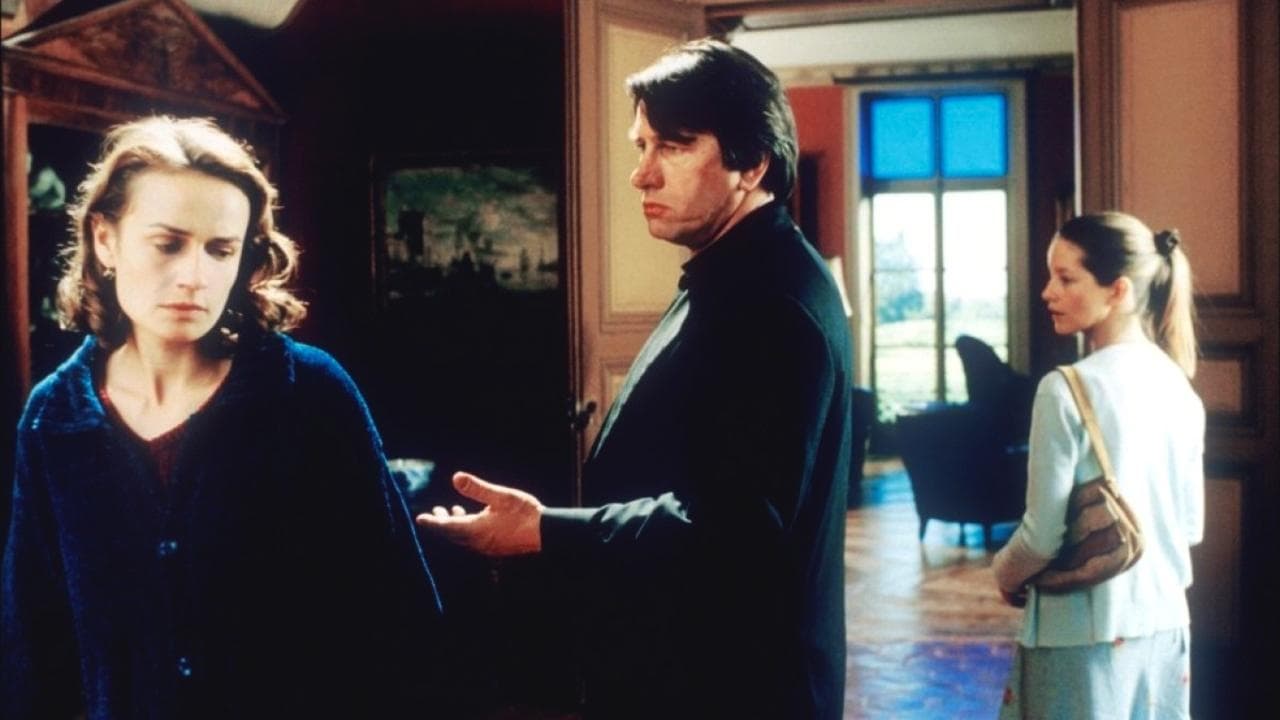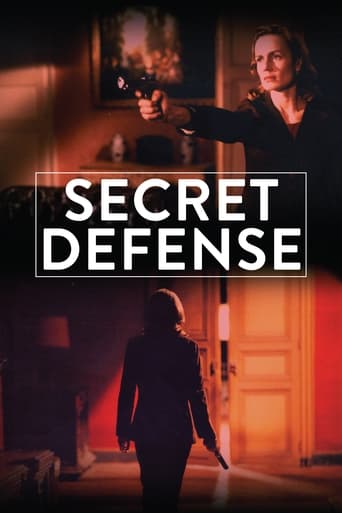


I like the storyline of this show,it attract me so much
... View Moreif their story seems completely bonkers, almost like a feverish work of fiction, you ain't heard nothing yet.
... View MoreIt really made me laugh, but for some moments I was tearing up because I could relate so much.
... View MoreIt is neither dumb nor smart enough to be fun, and spends way too much time with its boring human characters.
... View MoreThis is a spectacularly successful mystery film by director Jacques Rivette, who also collaborated on the screenplay. His films always contain long, lingering shots and scenes that seem to go on forever. Sometimes this can be so irritating one wants to scream. For instance, I tried three times to watch his LA BELLE NOISEUSE (1991) and gave up in exasperation each time because it was so boring, so enormously long, and like a vanity exercise. One would therefore think that the last person to make a successful thriller would be Rivette, with his slow pace. But incredibly, with this film, his snail's pace works perfectly and turns the film into a masterpiece. This would have been impossible without the genius actress Sandrine Bonnaire, who plays the lead and monopolizes the screen with complete success. Bonnaire made it clear to the world that she was at a higher level than most actresses in 1985 when she starred in Agnes Varda's extraordinary and searing film, VAGABOND (SANS TOI NI LOI). She is so quiet and meditative that she sucks the audience into the vortex of her thoughts, and carries us right along with her as she swirls with silent, unarticulated torment. She showed this again in the amazing L'EMPREINTE DE L'ANGE (MARK OF AN ANGEL aka ANGEL OF MINE, 2008, see my review). She really is one of the most intense and powerful actresses in the world today. In this film, she plays a cold, introverted, determined woman who has withdrawn into herself and is unable to return affection without the greatest of difficulty. The man who is constantly courting her and assuring her of his feelings is barely noticed by her, so absorbed is she in her own issues, and preoccupied by what is troubling her. 'Secret défense' is the French expression corresponding to 'official secret' in English. It is not necessarily a reference to military defence (British) or military defense (USA). Although Bonnaire's deceased father had been the head of France's largest defence contractor, succeeded by the mysterious figure of Walser, played with appropriate ambiguity by Polish actor Jerzy Radziwilowicz (which by the way means 'son of Radziwil' in Polish), who is so well known to cinema lovers from Andrezj Wajda's classic films MAN OF MARBLE (1977) and MAN OF IRON (1981), these hints of military secrecy flicker in the background like the reflections on a wall in an indoor swimming pool, but never come into focus. This all helps to create the air of menace and conspiracy which pervades this film, and which expresses the French attitude towards the worlds of officialdom, money and power. This film is primarily one of slow realization of what had previously seemed inconceivable to the normal and innocent mind. Bonnaire is brilliant at slowly coming to these realizations before our eyes, in the lingering shots where there is nothing between her face and us but her thoughts. How easily this film could have failed miserably! But she and Rivette together pull it off, almost as a miracle. I was on the edge of my seat for each and every prolonged scene, and never lost patience. The slow pace merely serves to heighten and intensify the unbearable suspense. Somehow Rivette knew the exact instant to cut. As soon as a scene has served its purpose, and been squeezed of the last of its juice, it skin is thrown into the bucket and we reach for the next fruit. I watched this film twice because I wanted to be sure. Yes, it really is a masterpiece of filmmaking. The music at the beginning and the end is viola da gamba music played by Jordi Savall (one of the world's two best gamba players, the other being the younger Paolo Pandolfo). The film's inherent ambiguity and theme of double-appearances is intensified by the acting of the amazing Laure Marsac, who plays identical twin sisters. Both of them are in a perpetual state of volatile and wavering uncertainty. After Bonnaire is informed by her younger brother that he has found evidence that their father had been murdered five years before, and that he was pushed from a train by someone, and did not jump and commit suicide as officially recorded, she receives a curious visit from Marsac, who is Walser's secretary and lover. This is one of the most ambiguous scenes in the film, in which nothing which is intended to be said is actually said by Marsac, and she reluctantly leaves without having made her purpose clear at all. The air of mystery is continually heightened by such devices of the story. Guns are continually being taken out of pockets and put into drawers or desks, and we don't know where they keep coming from. We are constantly aware that they are there, and could be removed and used by one of the many increasingly desperate people in this story. Then one of the twin sisters disappears and suddenly she is seen again by the shocked characters in the story, only to be revealed as the unknown twin whom they had not realized existed. She moves into the country mansion known as 'the Domaine' and assumes the role of her vanished sister. Meanwhile, Bonnaire's desperate younger brother is charging around on his motorbike with his gun, threatening to kill Walser, who he says killed his father in order to take over his company. A photo has mysteriously appeared, we are never told from where, showing Walser with his father on the train platform on the morning of the father's death, contradicting Walser's supposed alibi that he was elsewhere at the time. This film has two parallel stories, like two parallel universes, the false and the true. At how many points do these intersect? And how can truth be separated from illusion in this double world where it is not only sisters who are twins, but events themselves which exist in two forms and which bear an ambiguous and double interpretation?
... View MoreWith "Secret Defense", a celebrated "art" director (Jacques Rivette) tackles a popular "pulp" genre (the mystery thriller). The result is demanding yet unpretentious; what Rivette asks from his audience is simply to surrender to his own specific style and rhythm, which means: no musical score (except for the credits), long camera takes, detailed observation of (not always) insignificant everyday activities, no comic relief, etc. If you are prepared to do that, the film is very accessible; it has a solid, coherent plot and gives you, gradually, every piece of the puzzle. It's basically a meditation on the twists of fate, leading to a shocking yet plausible ending. And as you'd expect from a French film, the acting is exceptional; Sandrine Bonnaire doesn't simply play the central tormented character, she becomes one with it. On the whole, I think "Secret Defense" is a refreshing break from both "too-commercial" and "too-arty" fare, and an engrossing experience. *** out of 4.
... View MoreFor a start, it's not as boring, stale and jejune as Greek mythology. Really not up to Out 1, Merry-Go-Round, etc., but definitely a nice watch.However, someone has posted a comment making this movie "a modern Electra". That's not true. Of course, Electra must have been very much in Rivette's mind when conceiving the script. But the influences are far richer than just the Electra myth, and Rivette presents a much more subtle story than just a modern Electra. The most significant difference might be the motif for the murder of the father. Agamemnon was not murdered for noble reasons (as th father in the movie), but because Clytemnestra had an affair and wanted to get rid of him. This takes us away from the primitive Greek "A sleeps with B's C", "C's D therefore kills B and A's E", but then "E's F tries to sleep with A and F's G before killing himself, but fails to kill C" etc. Of course, we never learn in the movie where the brother got the photo (which reminds one of the oracle telling Electra's brother to get a revenge for the murder of their father), but then again, all the stuff about shooting the wrong person has nothing to do with the story of Electra. Well, notice the complete lack of intervention by the gods (in this case, mostly Appolo and Athena) in the movie; once again, something without which a Greek myth isn't a Greek myth anymore. Also, the nice twist at the end of the movie - Sylvie getting shot herself, again by accident - has no counterpart in the Greek myth. The story of the real Electra actually ends sort of well after Orest is found not guilty by the judges.On the side: The story of Electra can only be told faithfully if there is a story of a war in the background. Well, in the movie there isn't.So, please... It's really nice for some people that they are oh-so-cultivated. But they should either come up with a subtle analysis of the links between a modern script and some Greek (or otherwise classical) subject, or leave it.Anyway, having read the comment which turns "Secret Défense" into a remake of Vertigo, I should have to apologize. At least Electra clearly is intended reference/source of inspiration... whatever. On the other hand, the comparison with Vertigo and the comparison of Vertigo to Greenaway's "Cook, Thief, Wife, Lover" is so far fetched you cannot even see where the commentator got the idea. I've noticed the tendency of some (mostly Americans) to think of Hitchcock as the center of the cinematographic universe. Let me tell you: He isn't. He has made some entertaining films, but they are mostly based on overacted simplistic scripts, which fake psycho-grammatic depth but really just display simple psychologically prototyped characters.About the title of "Secret Défense". Those (non-native speakers of French) who are wondering about the strange ordering of adjective and noun in the title in French should go here: http://fr.wikipedia.org/wiki/Information_classifi%C3%A9e_en_France In this light, it is of course stupid of the US distributor to call the film "Secret Defense" in English - because that, as far as I can judge, means something completely different (i.e., it just has its literal meaning in English).
... View MoreModern version of the Elektra-myth, keeping rather close to the original (if you look closely), but making sense, in the typical Rivette way, also as a wild story of crime, revenge and love apart from the myth. Sandrine Bonnaire alone is worth the film.
... View More